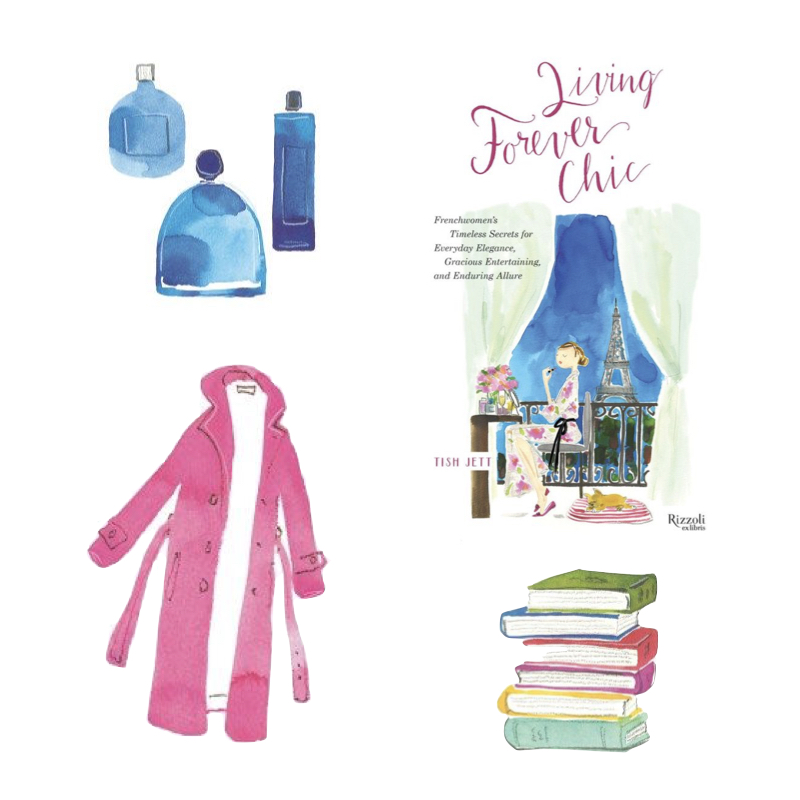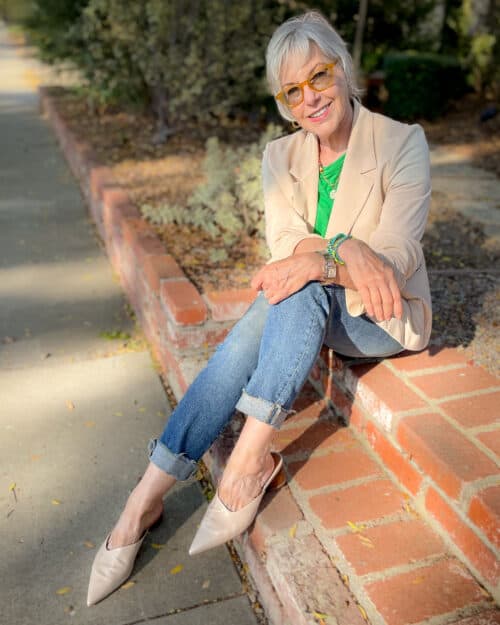L’Art de Vivre with Tish Jett
Living Forever Chic
Tish Jett’s newest book, “Living Forever Chic, Frenchwomen’s Timeless Secrets for Everyday Elegance, Gracious Entertaining and Enduring Allure” is finally here! This was a labor of love for Tish, and that comes through in every chapter.
In Living Forever Chic, Tish looks at the French idea of L’Art de Vivre (the Art of Living) as it applies to entertaining, homemaking, cooking, as well as beauty and style. She conducted dozens of interviews from a range of experts for this book, and shares a wealth of their knowledge.
But if you are afraid this will be a collection of intimidating French imperatives, pas du tout! Simplicity is at the heart of l’art de vivre. In every chapter, Tish includes a few actionable tips that are quick and easy to incorporate, such as how to remove common stains using ingredients on hand in most kitchens, or how to select and serve cheeses. I’ve bookmarked several that I’ll be trying soon!
I’ve known Tish for several years now. She is one of the most naturally charming and gracious people I’ve ever met and I count her among my dearest friends. Being able to spend time with her in person is always a delight and a highlight of my trips to Paris. Her warm and personable style comes through in every paragraph of this book. I was delighted when she agreed to do an interview, and answered my questions so thoughtfully.
L’Art de Vivre
Susan: You’ve lived in France and have been immersed in the culture for decades. During your research for the book, was there anything you learned about French culture (or lifestyle) that surprised you?
Tish Jett: In pondering your question I realized it would be more accurate to say that what I discovered in the many interviews in the book is confirmation of what I have been observing and experiencing after living in France for more than 30 years.
Let me explain. What I see, and what almost everyone with whom I spoke emphasized, was how history, culture, politesse, elegance, a reverence for intellect, and a deep appreciation for looking at our experiences through a philosophical lens seem to be the formula for a life well lived.
I have come to understand and deeply appreciate how the past enriches the present, how good manners, good books, good food, and good wine make life infinitely more pleasant.
Perhaps one of the most important lessons I’ve learned is that joy is sustainable, while happiness is a momentary (though undeniably agreeable) sensation and that we can bring joy into our lives every day in small sustainable ways from a simple, delicious meal shared at table with family on a Tuesday night to putting on lipstick and facing the world.
Among my friends and acquaintances I see how they accept with seeming equanimity the most difficult moments in their lives. Two of my very best friends say they find respite in small, purposeful gestures and routines that prove to them that they can control details that give them comfort and, yes, a certain joy.
One, now very much alone, takes her three dogs into the forest and watches them frolic. She tells me when she returns home she is refreshed and hopeful. The other has lived through terrible illnesses herself and with her husband. Her joy inducing strategy is arranging bouquets throughout her house and throwing small dinner parties. She admits it takes effort to entertain, but finds the benefits are worth it.
S: Have you incorporated any changes to your daily routines as a result of researching and writing this book?
TJ: To my great surprise I actually did.
I say that because I thought after the interviews in my first book combined with those in this one, and before that from my every day observations and experiences, that I had “gotten the message” and incorporated the best of the best into my life, but I seem to be a slow learner.
This is what I’ve done recently:
- Started to entertain again, slowly, but with resolve.
- Seriously emptied my closets. I realized how unhappy it was making me to look into the abyss seeing all the clothes I haven’t worn for years and never will. It was liberating once I got over my initial “had a good time in you” emotion.
- Completely purged, partially restocked, and perfectly rearranged the linen closet. I actually open the doors just to look at my beautiful handiwork.
- Started writing real, though short, put a stamp on it, take it to the post office, notes. (I have beautiful engraved notecards and stationery that have been languishing unused for years.)
- Remind myself to sit up straight.
S: It seems that much of l’art de vivre is about slowing down, appreciating, and paying attention to the everyday details of life. For those of us still caught up in a fast-paced and multi-tasking life, do you have any tips or “baby steps” to help us begin to shift gears?
TJ: You’re absolutely right.
L’art de vivre is part of the French DNA, but like the rest of us many struggle with the pressure and stress of the quotidian.
One of my favorite French expressions is the ironic, “Why make it simple when you can make it complicated?”
The message is clear: “Keep it simple.” In fact, “simple” was a recurring theme throughout my interviews.
I was told: Learn how to quickly make a few simple meals; pare down beauty routines; say “no” when someone wants to steal precious time; and don’t ever under-estimate the time-saving power of good organization from closets to the larder.
Then there is Sunday lunch. It’s the moment when everyone slows down, consumes a lovely meal with family and friends and truly takes the time to relax, enjoy good food, and talk. Out in the country where we live, Sunday lunches are often followed by long walks in the forest. The French love fresh air.
I think the reason why the French are struggling with laws about opening stores on Sundays is that it is not a day to shop, but rather because an important time to recharge, relax, and reunite with the important people in their lives.
S: Tell me about your ideal day in Paris…where do you go, what do you do?
TJ: My ideal day in Paris is meeting a girlfriend or girlfriends for a long lunch at some great people watching restaurant or bistro. (You know, like we do Susan.)
I love the idea of talking about the latest news, be it fashion or politics, and observing what stylish Frenchwomen at the other tables are wearing. It’s all about the shared experience of Paris – I never get over my excitement about being in Paris – and reconnecting with a friend.
In answering this seemingly simple question I realize that in the past I would have answered very differently. I would have talked about going to the designer collections, shopping, dressing up for big parties. . . but now my favorite Paris moments are lunches with friends. If we go to an exhibition together, all the better.
Mille mercis, Tish, for the wonderful interview! If you’re interested in everyday elegance and L’Art de Vivre, then Living Forever Chic should be on your fall reading list.
You can read Tish’s blog HERE.
Also: Forever Chic, Frenchwomen’s Secrets For Timeless Beauty, Style and Substance

Stay in touch
Sign up to be notified of new posts and updates from une femme d’un certain âge.



Having read her first book, I pounced on this one. It’s a treasure trove! There are many books on this subject ( I know, I’m a Francophile and have several) but this is one of the very best, and I know I’ll be referring back to it time and time again. It’s obvious that Tish put a lot of time and thought into this. It’s well written.
My dream would be to meet you two for lunch in Paris!
I can’t thank you enough for this interview. It reminded me of so many things that are important (and those that are not). I will be thinking of this all day!
Her book sounds wonderful, as was her first one. Loved your interview as well. “Started to entertain again…” I’ve found many people about our age, have stopped entertaining friends (myself included) and I’m not sure why that happens. I used to entertain friends so often and with ease.
I’ll be ordering her book for sure. Thanks Sue.
Your comment struck me as I’ve also often wondered why I’ve stopped entertaining. I used to love entertaining friends at dinner parties but I can’t remember the last time I hosted one. Hoping this book will inspire me!
Well done!
Thanks for sharing this with us! I enjoy Tish’s blog and now I need to get her book.
I, too, just cleaned out my closets and got rid of a lot of clothes I will never wear again. It is very liberating! If I am deliberating about a piece whether to keep or donate, I hold onto it since there will always be a “donate” card in my mailbox in a few weeks for another charity! Plus, there is always that one time you donate and you wish you had that item back! boohoo. I think if we honestly look at our closets, we probably only wear 25% of what we own!! I know I do!
I just finished the book yesterday, and I read her first book also. I love her thoughtful observations and gentle manner explaining the French life. I have been fortunate to visit Paris four times now, and I enjoy the thoughtfulness of the life there. I appreciate what I perceive, to be a love of beauty, from a flower bouquet, to the food, and the way they dress. It is difficult to find something close to that experience here at home, so I have surrounded myself as best I can, with French books, music, and blogs like this. Thanks so much.
Thank you very much for this post! The interview warmed my heart. It helps to be a “woman of a certain age” to appreciate that this interview is perfect for a fashion and style blog. Inner peace, or joy as Tish says, shines through. And to find joy in controlling the small details of our lives is the key. Many of us have mountains to overcome and some do not. But the simple joys that come from performing daily tasks well and entertaining our loved ones keeps us grounded and smiling. I do plan on buying her book.
I have been following you for several months now and enjoy you so much! I love the mix of French style and philosophy. I spent a summer in Aix en Provence 50 years ago and never fully recovered! Thanks for the tip on the book. Ordered!
I spent a semester in Aix in college, and go back in the summer every few years. It’s my Happy Place.
I don’t read books on fashion, French ones included. It appears that we, American women, need advice for about everything including on how to dress to how to entertain!! Really!? Well falks, let’s face reality! There’s a great French expression that describes the real life in France on a daily basis: “ boulot, metro, dodo”!! Which translates into, “work, metro, sleep “ routine! On the metro people look tired and eager to get home like everywhere in the world. Many are not “fashionista “. In fact, I find many more American women better dressed in banks, department stores, etc.. than the equivalent ones in France. And let’s face it, you can take a burlap sac, put it on, add a “fichu” (little cute scarf), a long chain, a cute little purse and sandals and “voila” you can look “very chic” too!! We juggle a lot and end up just fine as everywhere else!!!
I agree. I visited Paris many years ago. Some were well dressed and others were not, like anywhere else in the world. I think the idea of French style evolved from the early beginnings of the fashion houses in France that perpetuated a stereotype of the always fashionable French woman.
These women and their milieu certainly exist, but only in “les beaux quartiers” (the fashionable or affluent districts) in Paris and a few other major French cities. There are very specific things about French style, whatever the milieu or the social class but it is hard to boil them down to a few prescriptive rules.
But that doesn’t matter, as Tish is very perceptive.
It is silly to stereotype about anywhere, and there isn’t a huge difference between how my friends in the US and those in France dress.
However, I often find that women (educated, middle-class) tend to slather on far too much makeup than their counterparts in France, not to mention some who wear garish clothing.
But hell, we have stereotypes about certain Montréal neighbourhoods or suburbs!
When I am in Paris I find the secret ingredient is the antiquity; this is a city that has created and prized beauty for 3,000 years. There is a patrimony that is not just cultural, it is aesthetic. And my French friends visit North America and are in awe of the natural beauty of many locales. They go crazy for NYC. Last summer a Parisienne friend raved about the mill towns of New England, went out and bought all those replica antiques and vintagey looking quilts for her Paris apt. Go figure.
Tish is a delight and a fine writer.
Tish is authentically gracious. Many congratulations to her for this book!
I ordered both books after reading your post.
At 52 I’m refining how I live my life and how I see life. I think we do have things to learn from the French and many other cultures. I particularly love French and Italian culture and love Tush’s books.
Susan I also find your blog helpful and interesting!